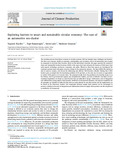| dc.contributor.author | Kayikci, Y. | |
| dc.contributor.author | Kazancoglu, Y. | |
| dc.contributor.author | Lafci, C. | |
| dc.contributor.author | Gozacan, N. | |
| dc.date.accessioned | 2021-12-14T07:37:02Z | |
| dc.date.available | 2021-12-14T07:37:02Z | |
| dc.date.issued | 2021 | |
| dc.identifier.issn | 0959-6526 | |
| dc.identifier.uri | https://dspace.yasar.edu.tr/xmlui/handle/20.500.12742/18498 | |
| dc.description.abstract | he transition process from linear economy to circular economy (CE) has brought many challenges and barriers. The three core concepts, which are smartness, sustainability, and circularity, need to be intertwined and adapted by companies to overcome these barriers. Based on this intertwined structure, this paper presents the concept of Smart and Sustainable Circular Economy (SSCE) at the macro-level and addresses the barriers of SSCE under four main aspects: technology, producers, consumers, and policy. Moreover, these four aspects are investigated for small and medium-sized enterprises of an Eco-Cluster in the automotive industry. The fuzzy DEMATEL method is used to uncover, analyse, and discuss the influencing and affected SSCE barriers critically. Finding these SSCE barriers gives an insight into the underlying problems of CE practices, as the only way to ensure an opportunity to achieve SSCE goals is to overcome them. The principal results show that problems of ownership issues in an Eco-Cluster, lack of governmental support and administrative burden, and lack of effective execution of environmental regulations are found as causal barriers that are difficult to change. Furthermore, lack of integration and collaboration among supply chain partners, ineffective CE framework adoption, and product complexity for CE principles are classified as effect barriers that are easily affected by the other factors and the implications can be shown in the short-term. Besides, the cooperation between supply chain partners can be encouraged to provide a solution to the lack of integration and collaboration between supply chain partners and the adoption of an ineffective CE framework. | en_US |
| dc.language.iso | English | en_US |
| dc.publisher | Elsevier | en_US |
| dc.rights | info:eu-repo/semantics/openAccess | en_US |
| dc.subject | Barriers | en_US |
| dc.subject | Circular economy | en_US |
| dc.subject | Eco-clusters | en_US |
| dc.subject | Fuzzy DEMATEL | en_US |
| dc.subject | Smart and sustainable circular economy | en_US |
| dc.subject | Sustainability | en_US |
| dc.title | Exploring barriers to smart and sustainable circular economy: The case of an automotive eco-cluster | en_US |
| dc.type | Article | en_US |
| dc.relation.journal | Journal of Cleaner Production | en_US |
| dc.identifier.doi | 10.1016/j.jclepro.2021.127920 | en_US |
| dc.contributor.department | Department of International Logistics Management | en_US |
| dc.identifier.issue | 314 | en_US |
| dc.identifier.wos | https://www.webofscience.com/wos/woscc/full-record/WOS:000685929200003 | en_US |
| dc.identifier.scopus | https://www.scopus.com/record/display.uri?eid=2-s2.0-85109371170&origin=SingleRecordEmailAlert&dgcid=raven_sc_search_en_us_email&txGid=f70b27a368b0444e3996c8c59f027739 | en_US |
| dc.contributor.yasarauthor | 0000-0001-9199-671X: Yiğit Kazançoğlu | en_US |















